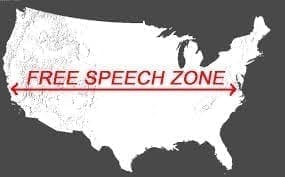“Safe Spaces” Used to Silence Political Speech
This article was featured in our weekly newsletter, the Liberator Online. To receive it in your inbox, sign up here.
In the last year, dozens of protests on college campuses have called for everything from supporting the #BlackLivesMatter movement to demanding that school administrators address racial microaggressions on campus. These protesters and students alike call for “safe spaces” on campuses so that they can have an open dialogue about these issues. But what they don’t realize is that these “safe spaces” are being used to silence political speech – especially speech that they don’t agree with.
For example, George Washington University police ordered a student to take down a Palestinian flag that was hanging from his dorm window because it was not “respectful of your peers,” according to an administrator.
Ramie Abounaja, a 20-year-old pre-med student, was visited by a GWU police officer in October. The officer claimed he had received “numerous complaints” about the flag and wouldn’t leave the room until it was removed. Abounaja complied, but later questioned whether he had actually violated any university policies.
Then, on Tuesday, to my alarm, I received an email from the Graduate Fellow Office of Student Rights and Responsibilities stating that they “received a report from the GW University Police Department regarding [my] behavior” that I was “found to have had a flag out [my] window” and that the letter “serves as a warning that this behavior is a violation of the ‘Code of Student Conduct and/or the Residential Community Conduct Guidelines.’” The letter also warned me to be “respectful” of my “peers” that “my behavior had the potential to leave a profound impact on the community.” The letter (attached) did not provide any details as to which provision, article or rule I violated.
According to The Intercept’s Andrew Fishman, GWU has no policy barring flags on the inside of dorm rooms, but it does prohibit flags hanging outside of the dorms – even though numerous amounts of flags have been seen flying outside of GWU dorm windows.
It seems as if the police are only called to remove flags that have offended others. Certainly, Abounaja is a victim of viewpoint discrimination. This kind of censorship—censorship of pro-Palestinian speech—is common according to Fishman:
Campus free speech and so-called “political correctness censorship” have been vigorously debated over the last two decades. That topic received particularly intense attention from journalists and pundits this year in response to controversies at the University of Missouri, Yale and other campuses.
In the first half of 2015 alone, Palestine Legal, a U.S. civil rights advocacy organization, has reported 140 instances of suppression of Palestine advocacy, 80 percent of which has happened on college campuses.
A Jewish student at the University of Michigan was recently investigated by a student government ethics commission after Palestinian students took offense at him aggressively criticizing a pro-Palestinian display. According to The College Fix, the commission affirmed that the student had a First Amendment right to question the demonstrators.
The University of Illinois at Urbana-Champaign fired Professor Steven Salaita for his anti-Israel tweets and his lawsuit is currently moving forward in a federal court. The University of California is attempting to label all criticism of the state of Israel as anti-Semitic hate speech and Occidental College may institute a microaggression reporting system.
The First Amendment rights of everyone are in danger if one person’s freedom of expression can be diminished by an administrator, campus police officer, or an emotional student. The words “hateful” and “offensive” are relative terms. We cannot protect the kinds of speech we find to be agreeable unless we can also protect the kinds of speech we find disagreeable.

